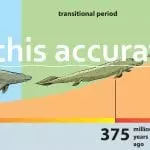[Originally published as The Ultimate Standard]
We previously covered the Münchhausen trilemma: an argument that knowledge is impossible because it can never be ultimately justified. Any (true) belief must be based on a good reason in order to be considered knowledge. But the reason is only good if it also is based on a good reason, which is based on a good reason and so on. Now this chain of reasoning either goes on forever, or it doesn’t. If it goes on forever, then human beings could know nothing since finite beings cannot know an infinite number of things. We could never complete the proof of anything, and an incomplete proof doesn’t prove anything.
So it seems that the chain of reasoning must terminate in a good reason that is foundational to all others. But how is this reason itself justified? It cannot be proved from a more foundational reason, otherwise it wouldn’t be the foundation (and we would simply ask the same question of the “more foundational reason”). Some people suppose that the foundational reason is intuitively self-evident. But not everyone agrees on what this ultimate reason is. Is it sensory experience, rationality, self? Apparently, it is not so self-evident. Furthermore, many things that seem intuitively self-evident (e.g. “the earth is stationary”) are later found to be false. Intuition isn’t a good reason to believe something.
Other people might suppose that we simply cannot prove the ultimate standard, but we accept it anyway as an unprovable axiom. The problem here is that we would literally have no good reason to accept such an ultimate standard. We would have no way of knowing if it is really true since it is unjustified. And since all other beliefs are ultimately based on this standard, their truth is based on its truth, which is unknown. In that case, we could know nothing. We could have beliefs, and perhaps many of them would be true; but they could not ultimately be justified and therefore would not be knowledge. The position that our ultimate standard is unprovable (but perhaps intuitive/obvious) is called foundationalism. It leads inexorably to the conclusion that we cannot know anything. But we do know things. So the solution must lie elsewhere.
The third option of Münchhausen trilemma seems problematic as well. This is the position that the ultimate standard proves itself. So the reason for the ultimate standard is, in some sense, the ultimate standard. But if the ultimate standard is based on itself, does this not commit the fallacy of begging the question? For a standard to prove itself seems like circular reasoning, which is generally considered fallacious—an error in reasoning.
I am going to suggest that God as revealed in Scripture is the ultimate standard for knowledge (Proverbs 1:7). Hence, all truth claims can only be justified if God’s Word is true. As such, God’s Word must somehow justify itself.¹ There is a degree of circular reasoning here, but is such reasoning fallacious? Of course, it is also the case that any competitor to the Christian worldview must also attempt to justify itself. Unbelievers often criticize believers for claiming that the Bible justifies itself, while they unwittingly appeal to their ultimate standard (naturalism, strict empiricism, etc.) as justifying itself. Any alleged ultimate standard must justify itself, otherwise either (1) it wouldn’t be ultimate, or (2) it wouldn’t be justified and we would have literally no reason to believe it.
Circular Reasoning
Most people have learned that circular reasoning is fallacious—a mistake in reasoning. And indeed, it usually is. Unfortunately, few people have reflected adequately upon why circular reasoning is faulty, and if there are any exceptions where it is legitimate. So a brief refresher on logical reasoning is in order.
To be logical is to think correctly—to draw reliable inferences or conclusions from accepted facts. There are two intellectual sins that derail correct reasoning. These are arbitrariness and inconsistency. To be arbitrary is to not have a good reason for a belief. If you don’t have a good reason to believe something, then it may very well be false. So it would be illogical to accept it as true. Inconsistency is when two or more things do not go well together, such as two contradictory statements which cannot both be true at the same time in the same sense. It would be illogical to believe both a statement and its negation (opposite), since they cannot both be true.
An argument is a conclusion based on one or more accepted statements that are called premises. A good argument has true premises and the conclusion follows from them. When the conclusion follows logically from the premises, the argument is valid. A fallacy is a common error in reasoning. Most fallacies make an argument invalid—meaning the conclusion does not follow from the premises. But circular reasoning is different. Circular reasoning is actually valid.
When conclusion B follows logically from premise A, the argument is valid—by definition. And when conclusion A follows logically from premise B, the argument is valid. It is perfectly consistent. Why then is circular reasoning considered a fallacy? The reason is that it is arbitrary. If the only reason to believe B is A, and the only reason to believe A is B, then both A and B might be wrong. In which case, neither is justified. We call such fallacious reasoning a vicious circle.
Virtuous and Vicious Circles
But what if the circle were not arbitrary? Consider how we might prove that laws of logic exist:
- Obviously, if there were no laws of logic, then we could not make any arguments.
- But we can make arguments.
- Therefore, laws of logic must exist.
This seems like a good argument. The premises are true, and the conclusion follows logically from them. So it is valid. Yet, this argument is subtly circular. Why? This argument has a structure referred to as modus tollens.[2] Modus tollens is a law of logic. So this argument uses a law of logic in order to prove that laws of logic exist. It assumes the very thing it attempts to prove, which is circular. And yet, it is not arbitrary.
Immanuel Kant argued that it is reasonable to believe in something if you would have to assume that thing in order to argue against it. That is, to make a logical argument that laws of logic do not exist, we would have to use laws of logic – in which case they do exist. Hence, laws of logic exist.
We cannot prove that laws of logic exist without using them, and hence there will be some degree of circularity. But it is not arbitrary. Rather, it is necessary because proofs require logic. So there is no violation of the principles of reasoning. The argument is self-consistent and non-arbitrary. We might call this a virtuous circular argument.
The Theology of Virtuous Circular Reasoning
Biblical oaths are much like the way beliefs are justified. People would swear by something greater than themselves as the standard that guaranteed that they would do what was promised. Hebrews 6:16 states, “For men swear by one greater than themselves, and with them an oath given as confirmation is an end of every dispute.” And God is the ultimate standard for any oath since there is nothing greater. Hence people swear to God when they mean to make the greatest promise possible. So then what standard does God use when He declares an oath?
Hebrews 6:13 states, “For when God made the promise to Abraham, since He could swear by no one greater, He swore by Himself.” Yes, the standard by which God swears is God. God uses circular reasoning. But it is non-arbitrary. God has a very good reason to swear by Himself, and this reason is explicitly stated in Hebrews 6:13. Namely, there is no one greater by which to swear. That is a good, non-arbitrary reason. Hence, it is a virtuous circle, not a vicious one.
In fact, all of God’s reasoning is necessarily circular. God is all-knowing. So, whenever God draws a conclusion from premises, the conclusion is something that God already knows. Truth is that which corresponds to the mind of God. And the justification for that truth is… that it corresponds to the mind of God. This is not arbitrary, but logically necessary since God’s mind determines all truth. Those people who argue that all forms of circular reasoning are fallacious are in the unenviable position of implying that God’s reasoning is fallacious.
[1] Otherwise, the Bible would be unjustified; and since all other truth claims depend on the truth of the Bible, they too would be unjustified and we could know nothing.
Continue reading with examples of how this plays out at The Biblical Science Institute







